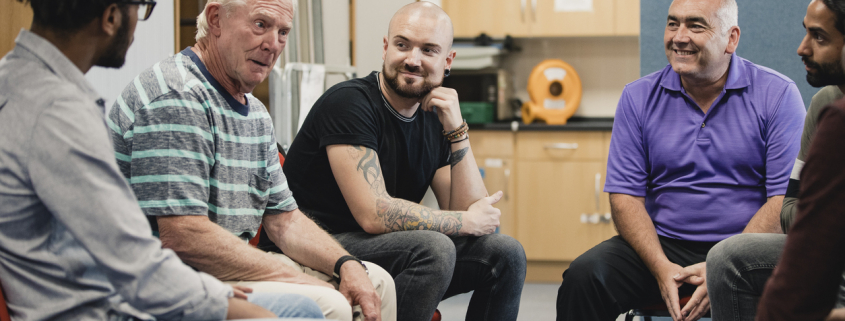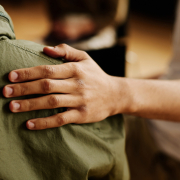Real mean DO eat quiche: myth-busting men’s mental health
Men’s mental health awareness is on the rise, and that’s undoubtedly a good thing. For generations the true nature of men’s mental health has been hidden away behind a mask of toxic, misplaced masculinity. A mask that defined vulnerability as a weakness; never to be expressed in any way, shape or form. A mask that enabled a narrow, homogenous interpretation of masculinity; a mythical genome of what it meant to be a man.
Only in the last few years has this myth of masculinity been busted. In its place has emerged a much healthier, more tolerant and refreshingly honest emphasis on manliness – or the harnessing of individual physiologies, environments, hormones, beliefs, and experiences that define any one male.
And its men themselves who are busting age-old myths. Thanks largely to increasing numbers who are willing to talk about the state of their mental health and wellbeing. Men who have tasted quiche and decided they like it.
Men’s mental health awareness: busting the most common myths
Myth: real men don’t ask for help
There’s a stigma that exists that “real men don’t ask for help”, but this is damaging and only perpetuates a feeling amongst men that they can’t or shouldn’t seek help. It is one of the biggest factors holding back men’s mental health awareness and stopping men from getting the support they need.
Men are susceptible to the same feelings as women, and they should be able to ask for help if they need it. In fact, it often takes more courage to ask for help than ignoring your problems.
The National Survey of Mental Health and Wellbeing – designed to provide lifetime prevalence estimates for mental disorders – shows that men in Australia are less likely to access services for mental health problems compared to women.[i]
Since Covid-19, many services have become digital, but the trend is still the same. Women are more than twice as likely as men to have used a digital service to access mental health support.[ii]
Myth: men don’t have any coping strategies
Another myth that’s been busted is the one that alleges men lack any coping strategies. That they are emotional loners without any means to support their mental health on their own.
However, a national study[iii] aimed at finding out the positive strategies men regularly use to prevent and manage depression dispelled this.
The study found that men used, and were open to using, a broad range of practical, social, emotional, cognitive and problem-solving strategies to maintain their mental health.
The top five strategies for prevention included eating healthily, keeping busy, exercising, humour and helping others.
Meanwhile, the top five strategies used for management were taking time out, rewarding themselves, keeping busy, exercising and spending time with a pet.
Myth: only women experience eating disorders
Not every male can achieve the coveted six pack, let alone the ‘Adonis Belt’ underneath, yet they’re bombarded with curated advertising and social media images suggesting otherwise – just as females are.
It’s no wonder that men – especially adolescent men – are as susceptible to objectified body consciousness as women. As men’s mental health awareness increases, so too does awareness that men can indeed struggle with eating disorders and body image issues.
Men account for over one third of people who experience an eating disorder.[iv]
Men account for approximately 20 per cent of people with anorexia nervosa, 30 per cent of those with bulimia nervosa, and 43 per cent of people with binge eating disorder. In fact, between, and 55-77 per cent of people with a specified feeding or eating disorder are male.
Myth: only weak people commit suicide
Every day in Australia, up to nine people take their own lives.
Approximately seven of these people will be men.
Men are three times more likely to die by suicide than women.[v]
The sheer volume of male suicides in Australia speak for themselves. They shatter any perception of weakness by those who tragically take their own lives. And they shine a fierce spotlight on the gulf between genders.
There are multiple reasons behind this, but some of the myths and stigmas we’re busting in this blog play an important role in that gulf.
Myth: a stiff drink will fix it
It isn’t just men’s mental health awareness that lags behind – a lot of men don’t know how to approach mental health challenges in a healthy manner.
A lot of men believe they are immune from depression or anxiety, and that a simple drink at the end of the day will help them to miraculously avoid the unavoidable.
Science does indicate that women are more likely to suffer from some mental health conditions such as anxiety or depression more than men but the same science reveals that mean are more prone to alcohol or substance abuse. Moreover, that alcohol or substance abuse can lead to serious depression, anxiety, or worse.
Trust us, a stiff drink at the end of another ‘bad day’ isn’t a fix for any mental health and wellbeing issues you may be facing. Unfortunately, there’s no magic elixir. But we do know that talking about your mental health with a professional is the best place to start.
Myth: men don’t need psychological treatment
There is an outdated view that men, for some inexplicable reason, don’t require psychological treatment. Not only is this completely false, it’s dangerous.
Imagine injuring yourself at work – badly – and deciding you didn’t need medical treatment? Your mental health and wellbeing is no different. Failing to get treatment will only make your problems or condition worse, leading to more serious and, in some cases, long term and unforeseen consequences.
Psychologists, therapists, counsellors and other allied health professionals are specially trained to support men living with a multitude of mental health conditions.
Myth: having a life partner will solve my problems
Some men think finding a life partner or even getting married will make any mental health problems magically disappear. Although it can be extremely positive to find someone you genuinely want in your life, it’s by no means a fix for any mental health issues you may be facing. In fact, being in a relationship for the wrong reasons may not only make your condition worse, it could jeopardise the relationship you value so highly.
Myth: only women suffer from the ‘baby blues’
It is a fact that women can find themselves feeling slightly down in the days after giving birth and that some can experience feelings of sadness and hopelessness for weeks, months and even years after giving birth.
But the ‘baby blues’ or postpartum depression as it is clinically known aren’t exclusive to new mums.
A 2019 study found that 45 per cent of fathers aren’t aware that men can experience postpartum depression as well as women.[vi]
Postpartum anxiety or depression affects up to one in five new mums and up to one in 10 new dads.[vii] The lack of understanding or awareness of its impact on men is a significant reason why so many either miss the tell-tale signs, or recognise that something is wrong but have no idea how to deal with unexplained feelings.
Myth: talk is cheap. Suffer in silence.
A lot of men still believe that simply talking about their mental health problems won’t help anything, or that it will make their problems worse by drawing attention to them.
While this attitude is changing thanks to those men who are talking to their family, friends and peers about their own mental health and wellbeing, it can take time for other men to re-organise decades of bad wiring.
Talking about your problems with family and friends can remind you that you’re not alone, which can be one of the most influential realisations for anyone dealing with mental health concerns.
That’s not to say that talking to your friends and family members always helps. In come circumstances your family and friends will instinctively try to identify a solution out of love and genuine concern for your wellbeing. However, that kind of response – in and of itself – can also be a reason for not talking to them. Sometimes people suffering from serious mental health concerns just want someone to listen.
That’s where a psychologist can help. Psychologists and other allied health professionals are trained to listen, and they understand that, sometimes, you just need to be listened to.
For urgent support
If there’s an immediate risk of harm to yourself or others, please call 000.
If you need someone to talk with now, call:
- MensLine Australia: 1300 789 978
- Beyond Blue: 1300 22 4636 or chat online at beyondblue.org.au
- Suicide Call Back Service: 1300 659 467
- Lifeline: 13 11 14
Need to talk to someone?
If you want talk to one of the Access Psych team, take a look at our registered and provisional psychologists near you.
Alternatively, if you have any questions about Access Psych and what else we can do for you, visit our Frequently Asked Questions page.
When you’re ready, you can book an appointment online, speak to one of our friendly team on 1800 277 924 or email info@accesspsych.com.au.
The information provided in this document is general in nature and is intended to be used for information purposes only. While we have tried to ensure the accuracy of the information published, no guarantee can be given that the information is free from error or omission or that it is accurate, current or complete.
The information published is not, and should not be relied on as, health or treatment advice. The diagnosis and treatment of any mental illness requires the attention of a physician or other properly qualified mental health professional. If you are seeking diagnosis or treatment of any other mental illness, you should consult a physician or mental health professional. You should not delay in seeking, or disregard, professional health advice because of something you have read in this document.
[i] https://www.abs.gov.au/statistics/health/mental-health/national-study-mental-health-and-wellbeing/2007
[ii] https://www.abs.gov.au/statistics/health/mental-health/national-study-mental-health-and-wellbeing/2020-21
[iii] https://www.ncbi.nlm.nih.gov/pmc/articles/PMC4647287/
[iv] https://nedc.com.au/eating-disorders/eating-disorders-explained/eating-disorders-in-males
[v] https://www.abs.gov.au/statistics/health/causes-death/causes-death-australia/latest-release
[vi] https://www.pc.gov.au/__data/assets/pdf_file/0017/250811/sub752-mental-health-attachment.pdf
[vii] https://panda.org.au/articles/perinatal-anxiety-and-depression-signs-and-symptoms





